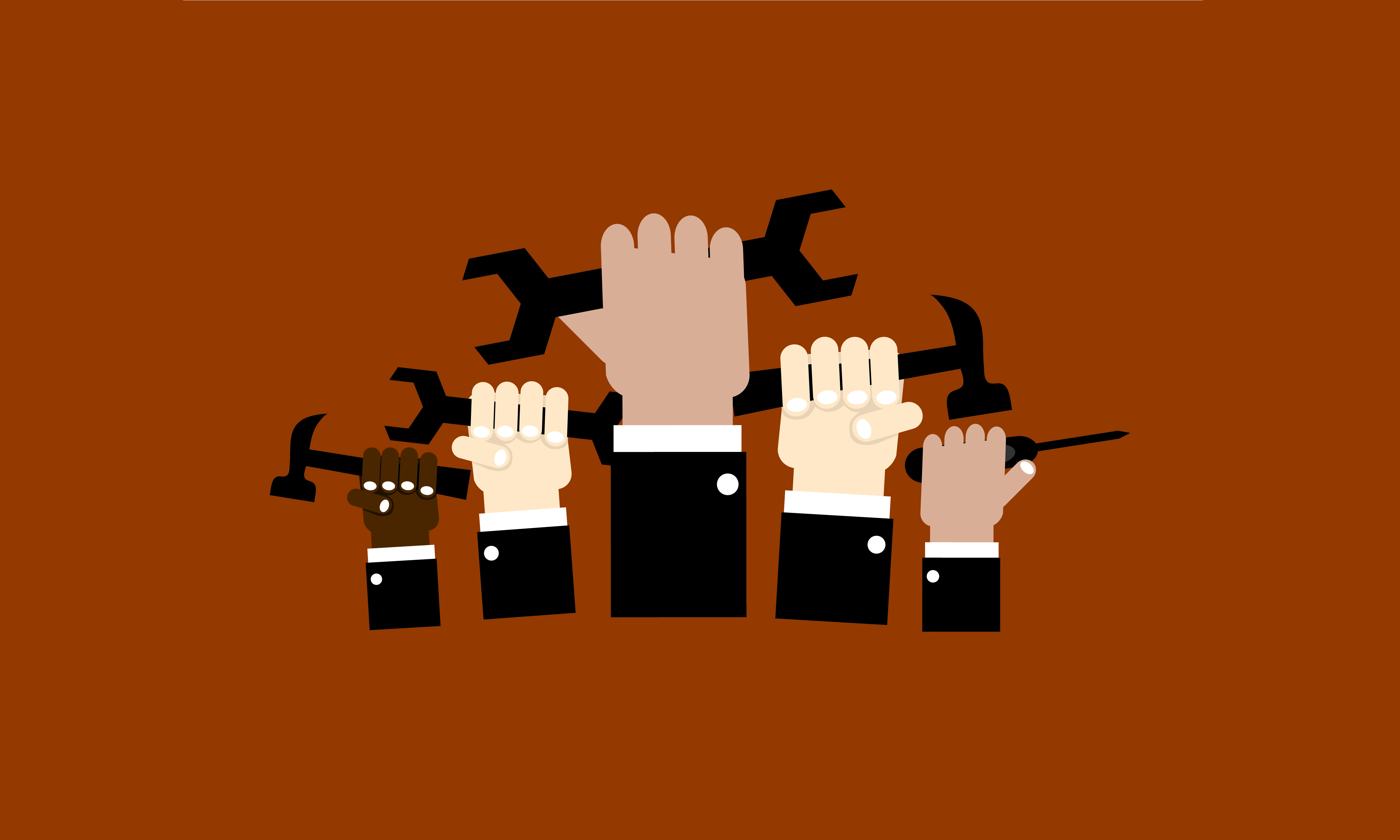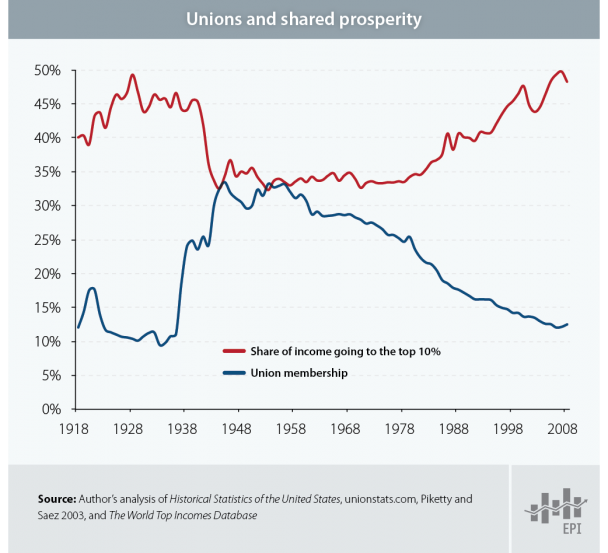Why conservatives should embrace labor unions
Unions are a small-government solution to inequality and wage decline, and they're a key part of the civil society social fabric conservatives want to wrap themselves in


A free daily email with the biggest news stories of the day – and the best features from TheWeek.com
You are now subscribed
Your newsletter sign-up was successful
Republicans want Americans to know that they think inequality is a problem, and they want to do something about it. And if they were smart, what they would do is embrace labor unions.
In recent weeks, GOP presidential hopefuls and congressional Republicans have shifted their rhetoric to focus on stagnating middle-class wages and the rising gap between America's rich and everyone else. Even their efforts to blame President Obama's policies for rising inequality are weirdly encouraging: It means they think the inequality issue has legs.
Unfortunately, as anyone who pays even tenuous attention to American politics can tell you, the GOP's long-standing ideological positions don't leave all that much room to actually do anything about inequality. Republicans' recent budgets show the party is still firmly committed to slashing the social safety net; and while Republicans say they're open to cutting tax loopholes for the wealthy, this is only on the condition that tax rates for the wealthy be lowered, too. Sure, Republicans have made noise about reducing the regulatory burden on new small businesses and reforming the criminal justice system. But these remain suggestions only, and if acted on, these initiatives would put Republicans on a collision course with their deference to state government and with some powerful interests in their coalition.
The Week
Escape your echo chamber. Get the facts behind the news, plus analysis from multiple perspectives.

Sign up for The Week's Free Newsletters
From our morning news briefing to a weekly Good News Newsletter, get the best of The Week delivered directly to your inbox.
From our morning news briefing to a weekly Good News Newsletter, get the best of The Week delivered directly to your inbox.
So what to do? Well, as Christopher Flavelle pointed out at Bloomberg View last month, there is an alternative, unconventional route for conservatives: Rebuild unions. It's a great idea.
Historically, unions have been one of the most effective tools for increasing workers' bargaining power, ensuring that a fair portion of the income the economy produces makes its way to everyday Americans. The historical interplay between rising or falling rates of union membership and rising or falling rates of inequality is remarkably tight.

The downward slide in union membership followed the slide in the middle class' share of national income very closely, and the moment just before 1980 when membership really went into decline lines up remarkably well with when inequality took off and when median wages disengaged from rising productivity. Meanwhile, studies suggest de-unionization can be blamed for as much as a third of the rise in inequality from 1973 to 2007.
The lesson is clear: Stronger unions seem to play a key role in reducing inequality.
A free daily email with the biggest news stories of the day – and the best features from TheWeek.com
But why would conservatives in particular embrace unions, which have long been seen as a core Democratic constituency?
As Flavelle notes, for all the GOP's historical hostility to the labor movement, unions provide a solution to rising inequality and stagnating wages that actually fits quite elegantly with Republicans' broader array of ideological commitments:
Increasing the bargaining power of workers… doesn't entail any new government spending. It doesn't further warp economic incentives. It doesn't use the tax code to take from some and give to others. It doesn't impose indiscriminate mandates on how much businesses must pay their workers. And it reflects a core conservative principle: Giving people the tools to fight for themselves, rather than relying on government to provide for them. [Bloomberg View]
But this case can be taken far beyond mere questions of income or how big government should be. In recent years, conservatives, and especially reform conservatives, have become increasingly concerned with the health of America's civil society: the network of families, marriages, churches, community groups, and voluntary organizations that make up the fabric of social life outside the government. It will hopefully escape no one's notice that unions are a textbook example of exactly this form of association; bringing workers and their families together in a shared communal purpose.
Unions have also been critical to maintaining the stable socioeconomic environment the rest of civil society needs to thrive. At the Family Studies blog, Anna Sutherland recently reported on a study by Daniel Schneider and Adam Reich that found union membership for men — after controlling for age, race, region, gender attitudes, and other factors — "is positively and significantly associated with marriage."
Sutherland also noted that union membership rates over the 20th century track with marriage rates. But she arguably undersells the point. The New York Times recently dug through data of American marriages since 1880, and rightly noted that the rise and then fall of marriage matches up loosely with periods of high then low then high inequality. The relationship between marriage rates and union rates is even more dramatic: Membership shot up from roughly 10 percent to 25 percent right around 1938, then up to almost 35 percent by 1948. According to the Times' data, marriage rates increased in the early 1940s, right on unions' heels. Union membership then began dropping just before 1958, and marriage rates started dropping just after 1960.
And if you look at the Times' numbers — or the data in Charles Murray's Coming Apart, for that matter — you'll see that the aforementioned late-70s inflection point is when marriage in the lower class broke off from the upper class trend and went into a tail spin. Unions' heyday didn't just coincide with high marriage rates, it coincided with a remarkable equality in marriage rates across the classes.
Schneider and Reich point to unions' positive impact on income, hours worked, job tenure, and benefits to explain why membership makes men in particular more likely to marry. And Robert Putnam, a sociologist who's done enormous work studying social capital in America, has been interviewing working-class families across the country, and concluded that the disappearance of good jobs is the lead culprit in the collapse of working-class marriages and communities.
It's not hard to see how access to a stable long-term income with good benefits would make men more attractive marriage partners, and how a lack of the same would make them less so. Nor is it hard to see how that lack of stable jobs could rework the social fabric away from marriage, and how the overwhelming likelihood of being permanently entrenched at the bottom of the income ladder would render the creation of stable family life largely irrelevant for members of the lower class.
In short, conservative-trumpeted values are much easier to practice when people have access to bourgeoisie wages and job security. Unions provide that access.
Jeff Spross was the economics and business correspondent at TheWeek.com. He was previously a reporter at ThinkProgress.
-
 The environmental cost of GLP-1s
The environmental cost of GLP-1sThe explainer Producing the drugs is a dirty process
-
 Greenland’s capital becomes ground zero for the country’s diplomatic straits
Greenland’s capital becomes ground zero for the country’s diplomatic straitsIN THE SPOTLIGHT A flurry of new consular activity in Nuuk shows how important Greenland has become to Europeans’ anxiety about American imperialism
-
 ‘This is something that happens all too often’
‘This is something that happens all too often’Instant Opinion Opinion, comment and editorials of the day
-
 The billionaires’ wealth tax: a catastrophe for California?
The billionaires’ wealth tax: a catastrophe for California?Talking Point Peter Thiel and Larry Page preparing to change state residency
-
 Bari Weiss’ ‘60 Minutes’ scandal is about more than one report
Bari Weiss’ ‘60 Minutes’ scandal is about more than one reportIN THE SPOTLIGHT By blocking an approved segment on a controversial prison holding US deportees in El Salvador, the editor-in-chief of CBS News has become the main story
-
 Has Zohran Mamdani shown the Democrats how to win again?
Has Zohran Mamdani shown the Democrats how to win again?Today’s Big Question New York City mayoral election touted as victory for left-wing populists but moderate centrist wins elsewhere present more complex path for Democratic Party
-
 Millions turn out for anti-Trump ‘No Kings’ rallies
Millions turn out for anti-Trump ‘No Kings’ ralliesSpeed Read An estimated 7 million people participated, 2 million more than at the first ‘No Kings’ protest in June
-
 Ghislaine Maxwell: angling for a Trump pardon
Ghislaine Maxwell: angling for a Trump pardonTalking Point Convicted sex trafficker's testimony could shed new light on president's links to Jeffrey Epstein
-
 The last words and final moments of 40 presidents
The last words and final moments of 40 presidentsThe Explainer Some are eloquent quotes worthy of the holders of the highest office in the nation, and others... aren't
-
 The JFK files: the truth at last?
The JFK files: the truth at last?In The Spotlight More than 64,000 previously classified documents relating the 1963 assassination of John F. Kennedy have been released by the Trump administration
-
 'Seriously, not literally': how should the world take Donald Trump?
'Seriously, not literally': how should the world take Donald Trump?Today's big question White House rhetoric and reality look likely to become increasingly blurred
